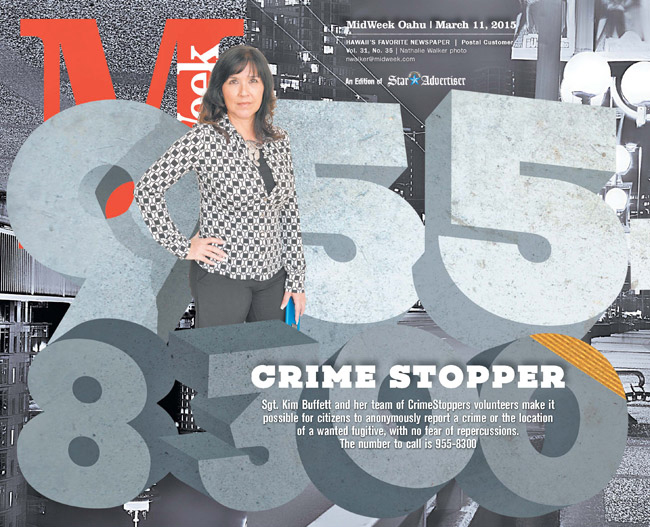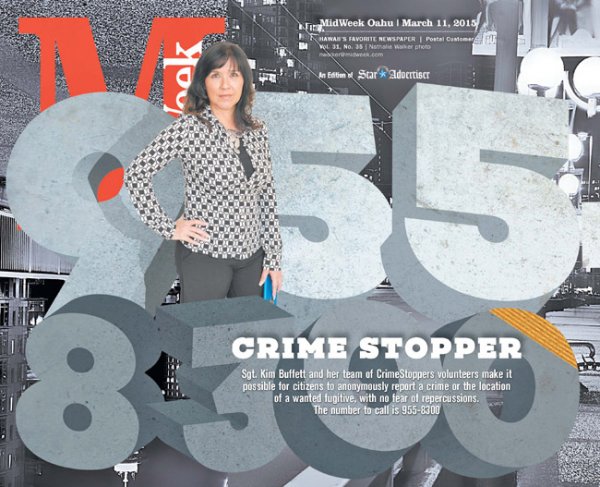Crime Stopper
In police work, it is information that feeds the beast. In Hawaii, the one who sets that table is CrimeStoppers and its leader, Sgt. Kim Buffett.
Their anonymous tip line allows the public to report crimes they see in their neighborhoods without fear of criminals finding out who snitched on them, for it is a fear of retribution by perpetrators that often outweighs the public’s desire for justice.
mw-cover-031115
“If they see a police officer coming down their street, they’ll look out their curtain, they will peek, but they will never go outside their house,” says Buffett, who took the helm at CrimeStoppers in 2005. “But they see a fire truck and they go running outside to see where the fire is.
“You don’t go talk to the officer because you are scared someone is watching you. But with a tip line — and it is anonymous and you know it is going to get to the police — you are going to call.”
The program is simple. If you see a crime being committed, know of a place where nefarious activities are occurring or see a fugitive featured on MidWeek‘s CrimeStoppers page, call the CrimeStoppers hotline and one of its volunteers will take all the information about the crime and give you a “tip number” that will serve as your ID. (CrimeStoppers also issues missing persons alerts and bank robbery bulletins through the media.)
When your tip leads to an arrest, you simply call the hot-line with your tip number and they allow you to choose which First Hawaiian Bank branch is most convenient for you, and inform you what day you can pick up your money. The reward scale is sliding, depending on the severity of the offense, ranging from $275 to $700 in cash with no repercussions for you.
The idea for CrimeStoppers was concocted in July 1976 by a New Mexico detective named Greg MacAleese, when a college student was gunned down at a gas station and no one came forward with any clues. MacAleese had worked as a newspaperman before he joined the police force and knew the power of the media to get information out. So he filmed a re-enactment of the crime to show on the news, put up a number to call anonymously and offered money from his own pocket for a tip that would crack the case.
Within 72 hours, they had arrested two men — and a movement was born.
Today there are thousands of CrimeStoppers programs around the world — currently in 59 countries. CrimeStoppers is credited with solving the 2005 London Subway bombings.
Tips have led to 664,000 arrests in the U.S. alone and the recovery of more than $4 billion in drugs and stolen goods.
Here in the Islands, CrimeStoppers has provided tips that solved nearly 7,000 cases since 1999 and paid out $359,000 in rewards.
CrimeStoppers has been in Hawaii since the 1980s, but under Buffett’s leadership, public awareness of its presence has risen to the top.
“When I first came to CrimeStoppers, I had never heard of it,” recalls Buffett, who worked the notorious Fourth Watch in Chinatown when she first joined the force. “My first goal in my five-year plan was that I was going to make it a household name. I wanted everyone to know what it was about because it is a great program and a great tool for people who are scared to talk to police officers or come forward with information. This way, they are anonymous and they can tell us whatever they want.”
If we did not have the volunteers, there is no way we could do the hotline. They come in after hours, on weekends — we have guys who have been volunteering here for 25 years.”— OFFICER MARIANO CARRIERA
This anonymity is especially important in schools, where peer pressure often rules. In 1997, it created Student CrimeStoppers, where kids can call in tips about things they see going wrong on their campus.
“We are available to every student on the island. We allow the students to report any crime on campus,” explains Buffett. “The good thing about Student CrimeStoppers is we pay up to $250, and with regular CrimeStoppers there has to be an arrest before we pay. With the students, we allow it to be other consequences, whether it be suspension, detention — anything under Chapter 19.
“All we want is to keep the school safe.”
She relates a story of one school that had experienced 300 unsolved robberies because everyone was scared to come forward. Once the students learned of the tip hotline, the case was solved within a week.
“We aren’t here to make you tattletales — we are just here so you know that you can go to school and be safe,” says Buffett.
CrimeStoppers also is partnering with the Attorney General’s office to offer presentations at the schools about the dangers of cyberbullying and sexting, calling it “Keep It Safe in Cyberspace.”
Though it works closely with the police department, CrimeStoppers is actually a nonprofit, and 100 percent of its funding comes from private donations. A fundraiser is set for March 27 at Honolulu Country Club with a sit-down dinner and a silent auction, and the money raised goes to the rewards for tips. But the organization itself is powered by volunteers who man the phones and answer hundreds of calls per month.
“If we did not have the volunteers, there is no way we could do the hotline. They come in afterhours, on weekends — we have guys who have been volunteering here for 25 years,” says Officer Marino Carreira, one of Buffett’s two staff members.
These volunteers come from all walks of life, like Christina Ha, a small-business owner, Korean translator and CS volunteer for the past 13 years.
“A lot of people are scared of police. It is a lot easier to talk to one of us,” says Ha.
Or Valentine Huihui, a 27-year HPD veteran who retired in 2002, but missed being around the station and returned to volunteer in 2006, bringing with him three decades of experience in asking the right question.
“I don’t need the training to extract the information,” says Valentine. “We try to steer them; some of the calls are off the wall, so I have to slow them down, get them to give a specific description of where they are, of the suspect, and always reminding them that this is anonymous.”
Their efforts are appreciated by law enforcement, from the beat cop working the streets to the chief sitting in his HQ offices.
“CrimeStoppers is a valuable partner in the fight against crime, and I am grateful for all of the support president Gary Yanagihara and the rest of the CrimeStoppers Board and volunteers provide,” says HPD Chief Louis Kealoha.
“They’re helping us to make our community safer for everyone. I’ve known Sgt. Buffett for many years, and she’s the right person for this job. She’s built tremendous community support for CrimeStoppers.”
Perhaps the best testimony to the impact it is having in the community is when you consider the reward money. On average, CrimeStoppers should pay out $100,000 a year in rewards, but only about $30,000 a year actually is collected. This, despite the anonymity of the pickup, is proof that stopping crime in their neighborhood is less about getting paid than about improving their community.
“I love what I do because we are here to keep people safe.
What a better way than to be anonymous: ‘Tell me what you need to tell me and have no fear of retaliation against you,'” says Buffett.
If you have a tip about a crime or the location of a fugitive, call CrimeStoppers at 955-8300 or report it online at crimestoppers-honolulu.org.







